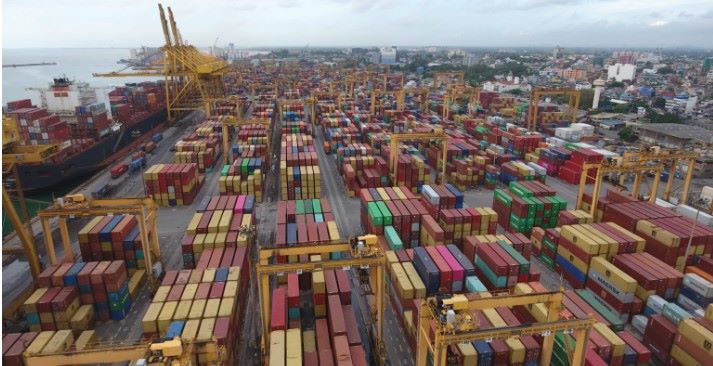By P.K.Balachandran
Colombo, June 23: The Colombo port’s West Container Terminal (WCT), a joint venture of the Adani group of India, the Sri Lankan company John Keells (JKH) and the Sri Lanka Ports Authority (SLPA), will be able to receive its first ships in 2024, according to Rohan Maskarola, Chief Executive Officer of the Shippers’ Academy of Colombo.
The preliminary works are being carried out and it is hoped that the first berth will be ready in 2024, Maskarola said. There has been a delay due to the current economic difficulties but work is on, he added.
Meanwhile, the website Maritime Gateway reported that the Sri Lankan partner in WCT, John Keells Holdings (JKH), is to borrow US$ 75 million from a Canadian financial institution through privately placed debentures. Out of this, US$ 70 million will be invested in the WCT.
“While the crisis-stricken and sovereign debt defaulting Sri Lankan economy is frantically seeking dollars to cover its necessities, such as fuel and cooking gas, Fairfax Financial Holdings Limited, situated in Canada, will lend the necessary dollars,” Maritime Gateway s said.
John Keells will issue 208.2 million debentures, each at LKR 130 to Fairfax Financial Holdings Limited. The convertible debentures will accrue interest at a rate of 3% per annum.
“The proceeds from the issue will be used to support the Company’s investment and financing obligations, particularly in terms of managing the foreign currency linked funding requirements in investments such the West Container Terminal (WCT) in the Port of Colombo,” JKH said in a stock filing on June 21.
JKH will invest US$ 70 million in the 3.2 million twenty-foot equivalent WCT. The US$ 650 million Colombo West International Container Terminal (Pvt) Ltd, will be 70/30 debt to equity funded. India’s Adani will hold a 51% stake, the Sri Lanka Ports Authority, the landlord, will hold a 15% stake and JKH 34%.
East Container Terminal
Referring to the situation in the SLPA-owned and run East Container Terminal (ECT), Colombo Shippers’ Academy CEO Maskarola said that work there has come to a halt because of the forex crisis in Sri Lanka.
Regretting that the Lankan government had reneged on the undertaking to give the ECT project to India’s Adani and the Japanese, Maskarola said that if only that promise had been kept, by the end of 2021, the ECT would have been humming with activity adding one million TEU to Colombo port’s capacity. The port is in dire need of capacity enhancement to be competitive in the international market, he pointed out.
Both Adani and the Japanese were disappointed by the denial of the East Container Terminal project. The Adanis had already ordered cranes for it. Eventually, Adani was compensated by the grant of the West Container Terminal project. The Japanese were displeased not only by the denial of the ECT, but also by the sudden and unceremonious cancellation of their US$ 2 billion Light Rail Transport (LRT) project in Colombo city.
The Ranil Wickremesinghe government, which came into being in May, is keen on patching up with Japan, a major investor and donor, given the exigencies of the current pathetic economic situation. He has indicated that he wants to revive the LRT project with Japanese financial and technical assistance.
But reliable sources said that the Japanese would not give a nod to any such big investments in Sri Lanka unless the economic situation improves or the Lankan government takes credible initiatives to set the country’s economic house in order.
Political Disorder Stymies Recovery
Enthusiasm among potential foreign investors is unlikely also because of the glaring political instability in Sri Lanka. Even as an IMF team was in Colombo talking to the Prime Minister, demonstrators blocked the gates of the Finance Ministry shouting slogans demanding that President Gotabaya Rajapaksa and Prime Minister Wickremesinghe quit office.
The main opposition party, Samagi Jana Balawegaya (SJB) and the smaller but very vocal, National Peoples’ Power party, are boycotting parliament for a weak demanding the exit of the President and the Prime Minister and the handing over of power to an all-party coalition.
Meanwhile, Wimal Weerawansa, a top leader of the 11-party coalition which had rebelled from the ruling Sri Lanka Podujana Peramuna (SLPP), said that the government is making a grave mistake by negotiating with the IMF as that will mean losing sovereignty and compromising on cherished pro-poor economic policies. He urged the government to talk to the Russians instead. Weerawansa has also pointed to the possibility of surrendering sovereignty to India in exchange for India aid. This could have an adverse impact on India’s goodwill for Sri Lanka.
Western Support Hangs on Thin Thread
If the anti-IMF sentiment gains momentum, and if the government becomes prey to it, Western nations, including the US, will not be forthcoming with funds. They have made it clear that their aid or funding programs would depend entirely on the acceptance of the prescriptions handed down by the IMF.
An IMF team is currently in Colombo talking to the government. Prime Minister Wickremesinghe expects an IMF bailout by the end of July. He has stressed the criticality of the IMF bailout saying that India’s largesse (totaling US$ 3.5 billion between January to now) cannot last forever. And the time is not far off when Sri Lanka will have to think of repaying the loans taken.
END





























































